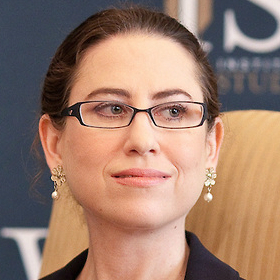Chinese Grand Strategy
Explore the implications of China’s global rise for U.S. primacy and the liberal international order.
July 24–28, 2023
Washington, DC
The highest grossing Chinese movie of all time is The Battle at Lake Changjin (2021), a three-hour film depicting the 17-day battle of Chosin Reservoir in the Korean War. It was financed as part of the Chinese Communist Party’s propaganda campaign leading up to the 100th anniversary of the Party’s founding.
While Chinese leaders still celebrate Mao Zedong’s decision to send “volunteers” to fight in Korea, in America—despite 40,000 killed and 100,000 wounded—the Korean War remains the “Forgotten War.” To understand why this war matters and why America’s foremost adversary thinks it matters, we will focus on T. R. Fehrenbach’s This Kind of War: The Classic Korean War History. Fehrenbach, a World War II and Korean War veteran, originally published his work in 1963 with the subtitle “A Study in Unpreparedness.” It remains a perennial part of general officer reading lists and war college curricula.
We forget the Korean War at our own peril. As an early test of America’s ability to resist communist expansion in the old Cold War, and the last time American and Chinese troops met on the battlefield, the Korean War offers lessons for how we win the new Cold War (and ensure it stays cold). As an undeclared and unresolved war, a “police action” paused since 1953 by an armistice agreement, the Korean War should shed light on the growth of executive authority when it comes to Constitutional war powers and America’s often reluctant leadership of the Free World.
With Fehrenbach’s This Kind of War as our guide, we will use the early Cold War to better understand our present-day confrontation with China.
Rep. Gallagher Outlines Vision to Deter CCP Invasion of Taiwan
This course is part of our Security Studies Program. Fellows may apply to one or more seminars, as fits their interest and schedule.

Mike Gallagher served for four terms in the U.S. House of Representatives as Wisconsin’s 8th Congressional District representative. Previously, he served seven years on active duty in the U.S. Marine Corps, including two deployments to Iraq.

Mike Gallagher served for four terms in the U.S. House of Representatives as Wisconsin’s 8th Congressional District representative. Previously, he served seven years on active duty in the U.S. Marine Corps, including two deployments to Iraq. He also was the lead Republican staffer for the Middle East and Counterterrorism on the Senate Foreign Relations Committee and worked in the private sector at an energy and supply chain management company in Green Bay.
Mr. Gallagher was the honor graduate from The Basic School, the Marine Corps CI/HUMINT Basic Course, as well as the MAGTF Intelligence Officers Course. He earned a Ph.D. in International Relations from Georgetown University. He also earned a Master’s degree in Security Studies with honors from Georgetown and a Master’s of Science in Strategic Intelligence from National Intelligence University. He earned his Bachelor’s degree from Princeton University with a focus on Near Eastern Studies and Arabic.

Aaron MacLean is a senior fellow at Hudson Institute and the host of the School of War podcast. Previously, he was senior foreign policy advisor and legislative director to Senator Tom Cotton of Arkansas. Aaron served on active duty as a U.S. Marine for seven years, deploying to Afghanistan as an infantry officer in 2009–2010.

Aaron MacLean is a senior fellow at Hudson Institute and the host of the School of War podcast.
Previously, Mr. MacLean was senior foreign policy advisor and legislative director to Senator Tom Cotton (R-AR). He served on active duty as a United States Marine for seven years, deploying to Afghanistan as an infantry officer in 2009–10. Following his time in the operating forces, he was assigned to the faculty of the US Naval Academy, where he was the 2013 recipient of the Apgar Award for Excellence in Teaching.
Mr. MacLean received a B.A. in philosophy and the history of math and science from St. John’s College, Annapolis, and an M.Phil. (Dist.) in medieval Arabic thought from the University of Oxford. He has been a Boren Scholar and a Marshall Scholar and lives in Virginia, where he was born.
Readings:
Discussion Questions:
Readings:
Discussion Questions:
Readings:
Discussion Questions:
Readings:
Discussion Questions:
Readings:
Discussion Questions:

Daniel Blumenthal
Dan Blumenthal is a senior fellow at the American Enterprise Institute, where he focuses on East Asian security issues and Sino-American relations. Mr. Blumenthal has served in and advised the US government on China issues for more than a decade.

Dan Blumenthal
Dan Blumenthal is a senior fellow at the American Enterprise Institute, where he focuses on East Asian security issues and Sino-American relations. Mr. Blumenthal has served in and advised the US government on China issues for more than a decade.

Vance Serchuk
Vance Serchuk is Executive Director of the KKR Global Institute and an Adjunct Senior Fellow at the Center for a New American Security. Prior to joining KKR, Mr. Serchuk served for six years as the senior national security advisor to Senator Joseph Lieberman (I-Connecticut).

Christian Brose
Christian Brose is a Senior Fellow at the Carnegie Endowment for International Peace and the Head of Strategy at Anduril Industries, prior to which he served as staff director of the Senate Armed Services Committee. He was also responsible for leading the production, negotiation, and passage of four National Defense Authorization Acts, which set policy and authorized spending for all U.S. national defense activities.

Matthew Kroenig
Matthew Kroenig is a Professor in the Department of Government and the Edmund A. Walsh School of Foreign Service at Georgetown University. A 2019 study in Perspectives on Politics ranked him as one of the top 25 most-cited political scientists of his generation. He has served in several positions in the U.S. Department of Defense and the intelligence community in the Bush and Obama administrations.

H.R. McMaster
H. R. McMaster is the Fouad and Michelle Ajami Senior Fellow at the Hoover Institution, Stanford University. Previously, he served as the 26th assistant to the president for National Security Affairs and as a commissioned officer in the United States Army for 34 years before retiring as a Lieutenant General. He is author of Battlegrounds: The Fight to Defend the Free World.

James M. Dubik
LTG James M. Dubik (U.S. Army, Ret.) is a Senior Fellow at the Institute for the Study of War and a Professor at Georgetown University’s Security Studies Program. General Dubik has extensive operational experience in Iraq, Afghanistan, Japan, Korea, Thailand, Bosnia, Haiti, Panama, Honduras, and in many NATO countries.

Frederick W. Kagan
Frederick W. Kagan is a Senior Instructor with the Hertog War Studies Program at the Institute for the Study of War. The author of the 2007 report “Choosing Victory: A Plan for Success in Iraq,” he is one of the intellectual architects of the successful “surge” strategy in Iraq. He is the director of AEI’s Critical Threats Project.

Kimberly Kagan
Kimberly Kagan is a Senior Instructor with the Hertog War Studies Program and founder and president of the Institute for the Study of War. She is a military historian who has taught at the U.S. Military Academy at West Point, Yale, Georgetown, and American University.